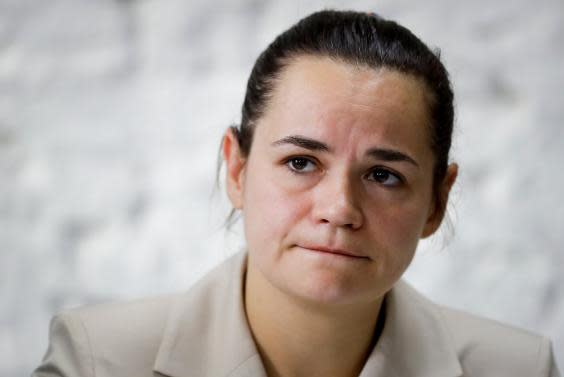Belarus election: Opposition candidate rejects official results after authoritarian president Lukashenko claims landslide victory

The main opposition candidate in the Belarus election has rejected official election results that handed president Alexander Lukashenko a landslide victory amid bloody protests and accusations of vote-rigging.
“Of course we don’t recognise these results,” said Sviatlana Tsikhanouskaya after the country’s electoral commission put the former teacher’s share of the vote at only 9.9 per cent.
The incumbent president, often referred to as Europe’s last dictator, was claimed to have secured 80.23 per cent of ballots, a figure widely seen as not credible.
Ms Tsikhanouskaya told reporters in Minsk: “According to the data we receive from precincts, we won, and this corresponds with what we saw at polling stations.
“People stood in lines at polling stations in order to vote for Tsikhanouskaya. I believe my own eyes rather than the data of the Central Election Commission.”
Foreign observers have not judged an election to be free and fair in Belarus since 1995. In the run-up to the Sunday’s vote, authorities jailed Mr Lukashenko’s political rivals and open criminal investigations into others who voiced opposition.
Ms Tsikhanouskaya said her team was “gathering proof of falsification”.
“We have official protocols from many poll stations, where the number of votes in my favour are many more times than for another candidate,” she told the Associated Press.
Ms Tikhanouskaya entered the race following the imprisonment of her husband, who had intended to run. She emerged from obscurity to draw some of the biggest crowds since the fall of the Soviet Union at her campaign rallies.
Police violently broke up protests which sprang up on Sunday after the election results were announced. In Minsk, which saw the worst of the violence, police deployed water cannon, stun grenades and rounds of rubber bullets against demonstrations and drove a van into crowds. Dozens were injured and there were reports of one person being killed.
Amnesty International said its researchers on the ground had documented arbitrary arrests and excessive use of force against peaceful protestors.
Ms Tikhanouskaya warned Mr Lukashenko that protests would continue if he tried to cling to power and called for demonstrators to take to the streets on Monday night.
Her campaign also appeared to call for an general strike to begin from Tuesday in a message shared with supporters on Telegram.
In Zhlobin, a city in eastern Belarus, workers at a metal plant declared they would go on strike in protest over election-rigging and urged others to join them.

Mr Lukashenko, who has held office since Belarus’s first presidential election 26 years ago, warned protesters challenging the official vote results would face a tough crackdown and derided his critics as “sheep” supposedly manipulated by foreign governments.
“We will not allow them to tear the country apart,” he said, claiming he wanted his victory to be “a holiday for the people. But some wanted to spoil that holiday”.
The president claimed without evidence that opposition to his iron-fisted rule was being directed from Poland and the Czech Republic
“They are trying to orchestrate mayhem. But I have already warned: there will be no revolution,” he said.
The brutal police crackdown drew condemnation from Belarus’s European neighbours and will likely complicate Mr Lukashenko’s efforts to mend ties with the West amid tensions with his main ally, Russia.
The European Union lamented that “the election night was marred with disproportionate and unacceptable state violence against peaceful protesters” and called for the immediate release of arrested demonstrators.
The EU and United States slapped sanctions on Belarus in the early 2000s, but lifted most of them in recent years after Mr Lukashenko’s government freed political prisoners and allowed some opposition protests.
A spokesperson for British prime minister Boris Johnson on Monday condemned the violent suppression of protests in Belarus as “completely unacceptable”.
They added: “We have previously made clear on many occasions our significant concerns about Belarus’s anti-democratic actions, including the detention of opposition candidates, peaceful protesters and journalists. We’re raising our concerns, again, with the government of Belarus following these protests.”
Read more
Protester in ‘intensive care’ after clashes over Belarus election
Police and protesters clash on streets as Lukashenko declared winner

